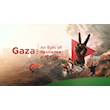UNRWA: 'Israel' violating law by blocking urgent Gaza aid deliveries
UNRWA says thousands of truckloads of food and supplies remain stalled in Jordan and Egypt, warning that Gaza’s population faces worsening deprivation.
-

Starved Palestinians carry sacks and boxes of food and humanitarian aid that was unloaded from a World Food Program convoy that had been heading to Gaza City in the northern Gaza Strip, Monday, June 16, 2025. (AP)
"Israel" is breaching international law by maintaining severe restrictions on the flow of humanitarian aid into Gaza, where Palestinians continue to face acute shortages of food, medicine, and essential supplies as winter approaches, a senior UNRWA official has warned.
Speaking during a recent visit to Brussels, Natalie Boucly, UNRWA’s deputy commissioner general, said the international community, including the EU and the US, must step up pressure on "Israel" to allow unrestricted aid access.
UNRWA currently has enough food, tents, and relief supplies to fill as many as 6,000 trucks, Boucly said.
“As winter approaches and famine continues to grip the population, it is critical that all this aid is allowed into Gaza without delay,” she said.
“Our supplies would be able to provide food … for the entire population for about three months. And that is sitting outside [in Jordan and Egypt], not able to come in. And that is the case for the other UN agencies because the restrictions and the constraints are still there,” she stressed.
She estimated that only around half, “if that”, of the 500–600 truckloads needed each day are entering the devastated territory.
UNRWA cites Geneva Convention and ICJ ruling
Boucly stressed that "Israel", as the occupying power, was “not abiding by international humanitarian law and international human rights law,” citing the Fourth Geneva Convention as well as a recent advisory opinion from the International Court of Justice affirming that "Israel" must ensure Palestinians have access to “the essential supplies of daily life.”
The ICJ opinion, delivered on October 22, also underscored "Israel’s" obligation to cooperate with UNRWA and found no evidence supporting Israeli claims that the agency lacks neutrality or that significant numbers of its staff belong to Hamas.
Despite the court’s findings, Boucly said she had seen no signs that "Israel" intended to reverse its policy of severing ties with UNRWA. "Israel" cut diplomatic relations after accusing the agency of infiltration by Hamas and alleging “widespread and systematic” misuse of its facilities, claims the ICJ concluded were not substantiated.
UNRWA’s crucial role and funding crisis
Created in 1948 to support 700,000 Palestinians forcibly displaced, UNRWA was originally intended as a temporary body. Nearly eight decades later, it remains a critical provider of education, healthcare, social services, and humanitarian relief to 5.9 million registered refugees across the region.
“It is not the time for UNRWA to collapse,” Boucly said. “[We are] irreplaceable because nobody can pick up the slack.”
In Brussels, she was also expected to raise the agency’s $200m (£152m) funding shortfall for the period through March.
“We were meant to be temporary. The only reason we’re here is because there’s a collective failure of the international community to come to a political solution to this conflict,” she said.
Boucly noted that, for the first time since the 1993 Oslo Accords, there appeared to be genuine prospects for progress toward a lasting political settlement. While stressing that the UN does not dictate political outcomes, she warned against allowing “this unique opportunity” for peace to slip away.
European governments urged to increase pressure
She argued that European governments should apply “a different sort of moral pressure on Israel … that you need to have a reconciliation process, that military might is not going to make you live in peace.”
Boucly, who worked in occupied al-Quds in 2023, recalled the shift in public sentiment following October 7, 2023. She said she had been verbally assaulted and that some UNRWA staff were physically attacked as the agency became the focus of anger inside "Israel".
Furthermore, Boucly expressed concern that significant parts of the diplomatic process were taking place “outside of the usual tools of multilateralism and the usual UN construct around peacekeeping.”
She said key details were missing from the proposed US-chaired “board of peace,” including its membership and terms of reference. “You have to know where you are sailing, otherwise the winds are going to take you to a different destination,” she said.
Children’s trauma deepens as education tools are blocked
UNRWA is offering a few hours of schooling and psychological support to around 40,000 children across 280 “temporary learning spaces” inside Gaza shelters.
But the agency says its work is being severely hampered because "Israel" is prohibiting the import of pens, notebooks, and other basic educational materials.
Children attending these centres have endured two years of catastrophic upheaval, repeated displacement, the killings of close relatives, hunger, and constant bombardment.
By early September, at least 2,596 children had lost both parents in Gaza, while an additional 53,724 had lost one parent, 47,804 their father, and 5,920 their mother, according to Gaza health ministry data cited by UNICEF.
Boucly warned that Gaza’s newly orphaned children face bleak prospects unless the world offers them hope.
Read more: Gaza and the logic of necropolitics: Sovereignty measured by killing

 5 Min Read
5 Min Read










